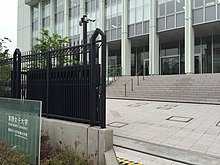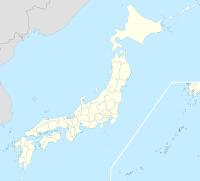Jissen Women's University
This article needs additional citations for verification. (September 2022) |
| |
 | |
Other name | Jissen; Jitsujo |
|---|---|
| Type | Private |
| Established | 1899 |
Parent institution | Jissen Women's Educational Institute |
| Address | 4-1-1 Ōsakaue , , Tokyo , Japan |
| Campus | Hino (Hino City, Tokyo) Shibuya (Shibuya City, Tokyo) |
| Website | www |
Note: This university’s faculties are the Faculty of Humanities, the Faculty of Human Life Science and the Faculty of Human and Social Studies. In addition, its graduate schools are the Graduate School of Humanities, the Graduate School of Human Life Science and the Graduate School of Human and Social Studies. | |
Jissen Women's University (実践女子大学, Jissen joshi daigaku) is a Japanese private women's college with its headquarters in 4-1-1 Ōsakaue, Hino, Tokyo, Japan. The school was founded by poet and educator Utako Shimoda in 1899. It was chartered as a university in 1949. Its University abbreviations are Jissen (実践, 'Jissen') and Jitsujo (実女, 'Jitsujo').
Overview
[edit]University as a whole
[edit]

Jissen Women's University views the private women's university "Shimoda School" (later renamed "Tōyō School"), opened by Utako Shimoda in 1882 (Meiji's 15th Year), as its origin.[1] This developed and became Jissen Girls' School in 1899 (Meiji's 32nd Year).[2] In the early days of the school opening, it was located in modern-day Kudan, Chiyoda City, Tokyo, but relocated to Tokiwamatsu in Shibuya in 1901 (Meiji's 34th Year).[2] With the educational system reform, it transitioned to a university under the new system and became Jissen Women's University in 1949 (Shōwa's 24th Year).[3]
In 1986 (Shōwa's 61st Year), it completely relocated from Shibuya to Hino, but Shibuya Campus was opened in 2014 (Heisei's 26th Year).[4] Currently, the Faculty of Humanities, the Faculty of Human and Social Studies and the Junior College are located on Shibuya Campus and the Faculty of Human Life Science is located on Hino Campus.[5]
Educational Ideals
[edit]Nurturing women who are capable of displaying dignity, elegance, independence and self-management.[6]
Brief history
[edit]- 1882 (Meiji's 15th Year) Utako Shimoda founds a private girls' school (later changes the name of the school to "Tōyō School") in Kudan, Tokyo.[4]
- 1899 (Meiji's 32nd Year) It founds the private Jissen Girls' School and the Girls' Arts and Crafts School in Kōjimachi, Tokyo as a project of the Imperial Women's Association. Utako Shimoda becomes the first principal.[4]
- 1903 (Meiji's 36th Year) Jissen Girls' School and Girls' Arts and Crafts School relocate to a new school building in the Tokiwamatsu Detached Palace in Shibuya, Tokyo.[7]
- 1925 (Taishō's 14th Year) It establishes Jissen Women's Specialized School.[3]
- 1928 (Shōwa's 3rd Year) It grants the privilege of English Literature secondary-school teacher licenses without examination to specialized faculty English Literature graduates.[3]
- 1945 (Shōwa's 20th Year) Many school buildings are destroyed by fire due to war damage.[4]
- 1949 (Shōwa's 24th Year) It transitions to a university under the new system and establishes Jissen Women's University.[4]
- 1950 (Shōwa's 25th Year) It establishes Jissen Women's Educational Institute Junior College.[4]
- 1986 (Shōwa's 61st Year) The university and graduate school completely relocate to Hino Campus.[4]
- 1995 (Heisei's 7th Year) The Faculty of Home Economics is renamed the Faculty of Human Life Science.[3]
- 2004 (Heisei's 16th Year) It newly establishes the Faculty of Human and Social Studies.[4]
- 2014 (Heisei's 26th Year) The Faculty of Humanities, the Faculty of Human and Social Studies and the Junior College relocate to Shibuya Campus.[4]
Basic data
[edit]Locations
[edit]Image
[edit]Emblem
[edit]It has the shape of a cherry blossom.
School song
[edit]- Lyrics: Utako Shimoda, Composition: Kōichi Sawada
Education and research
[edit]Organization
[edit]Faculties
[edit]- Faculty of Humanities
- Faculty of Human Life Science
- Department of Food and Health Science
- Registered Dietitian Major
- Food Science Major
- Health and Nutrition Major
- Department of Human Environmental Science
- Department of Life and Culture
- Life Psychology Major
- Early Childhood Education Major
- Department of Contemporary Human Life Science
- Department of Food and Health Science
- Faculty of Human and Social Studies
- Junior college
Graduate schools
[edit]- Graduate School of Humanities
- Japanese Literature Program (Master's and Doctoral Programs)
- English Literature Program (Master's Program)
- Aesthetics and Art History Program (Master's and Doctoral Programs)
- Graduate School of Human Life Science
- Food Science and Nutrition Program (Master's and Doctoral Programs)
- Human Environmental Science Program (Master's Program)
- Graduate School of Human and Social Studies
- Humanity and Social Science Program (Master's Program)
Education
[edit]On-campus scholarship
[edit]Jissen Women's University has its own scholarship program, and has reached the point where students can apply for them according on their situation.
- Grant-type
- Shimoda Scholarship
- Sakura Scholarship
- University President's Award Scholarship
- Sugako Tonohara Scholarship
- Noboru and Akiko Hayama Scholarship - Noboru Hayama is the founder of Riso Scientific Industries Corporation
- Faculty Scholarships (scholarships aimed at those with sudden changes in household budgets)
- Loan-type
- General scholarships
- Emergency Special Scholarship (a scholarship aimed at those with sudden changes in household budgets)
- Emergency loan for school fees (a scholarship aimed at those with sudden changes in household budgets)
Student life
[edit]School festival
[edit]- Tokiwa Festival
- A school festival shared by Jissen Women's University and the Junior College. The festival is held in October and November. The name of the Tokiwa Festival derives from "Tokiwamatsu-chō", the old town name of Shibuya, Tokyo, where the school building was located before it relocated to Hino City. Moreover, since the leaves of the evergreen pine tree are always green and do not change colour, it also includes the meaning of permanence.
University officials and organizations
[edit]University affiliate organizations
[edit]- Mukōda Library
- Jissen Women's University Supporters' Association
List of university officials
[edit]Facilities
[edit]Campuses
[edit]Hino Campus
[edit]- Faculty using Hino Campus: Faculty of Human Life Science
- Graduate school using Hino Campus: Graduate School of Human Life Science
- Transportation access
- 14-minute walk from Hino Station operated by JR East
Shibuya Campus
[edit]- Faculties using Shibuya Campus: Faculty of Humanities, Faculty of Human and Social Studies, Junior College
- Graduate schools using Shibuya Campus: Graduate School of Humanities, Graduate School of Human and Social Studies
- Transportation access
- 10-minute walk from Shibuya Station operated by JR East, Tōkyū, Keiō Electric Railway and Tokyo Metro Co., Ltd.
- 12-minute walk from Omotesandō Station operated by Tokyo Metro
External affairs
[edit]Agreements with other universities
[edit]- National, academic exchange, etc. partner universities
- International, academic exchange, etc. partner universities
Affiliated schools
[edit]- Jissen Women's Educational Institute Junior and Senior Schools
- Jissen Women's University Junior College
See also
[edit]WikiProject Higher education (talk · project cat · project pages · random · edits)
References
[edit]- ^ Jissen Women's Educational Institute 100-Year History Compilation Committee (31 March 2001). 実践女子学園100年史 [Jissen Women's Educational Institute 100-Year History] (in Japanese). Jissen Women's Educational Institute. p. 13.
{{cite book}}: CS1 maint: numeric names: authors list (link) - ^ a b Jissen Women's Educational Institute 100-Year History Compilation Committee (31 March 2001). 実践女子学園100年史 [Jissen Women's Educational Institute 100-Year History] (in Japanese). Jissen Women's Educational Institute. p. 79.
{{cite book}}: CS1 maint: numeric names: authors list (link) - ^ a b c d Jissen Women's Educational Institute 100-Year History Compilation Committee (31 March 2001). 実践女子学園100年史 [Jissen Women's Educational Institute 100-Year History] (in Japanese). Jissen Women's Educational Institute. pp. 947–1041.
{{cite book}}: CS1 maint: numeric names: authors list (link) - ^ a b c d e f g h i Inoue, Kazuo (9 February 2017). 渋谷・実践・常盤松:知っていますか 過去・現在・未来 [Shibuya, Jissen and Tokiwamatsu: Do You Know Them? Past, Present and Future] (in Japanese). Seiunsha. p. 6-5. ISBN 9784434227332.
- ^ a b c "実践女子大学アクセスガイド" [Jissen Women's University Access Guide] (in Japanese). Jissen Women's University. 8 June 2022. Retrieved 8 June 2022.
- ^ "建学の精神と教育理念" [Founding Spirit and Educational Ideals] (in Japanese). Jissen Women's University. 15 June 2022. Retrieved 15 June 2022.
- ^ Rokurō Hayashi (30 September 1978). Society for Building a Hometown in Tokyo (ed.). 渋谷区の歴史 [The History of Shibuya City]. 東京ふる里文庫 (Tokyo Hometown Library) (in Japanese). Vol. 11. Meicho Shuppan. p. 131. ISBN 9784626002716.
- ^ "放送大学 平成28年度 単位互換案内" [The Open University of Japan; Heisei's 28th Fiscal Year (The fiscal year of twenty sixteen); Guide to Credit Transfer] (PDF) (in Japanese). The Open University of Japan. 21 February 2016. Archived from the original (PDF) on 21 February 2016. Retrieved 27 December 2015.



